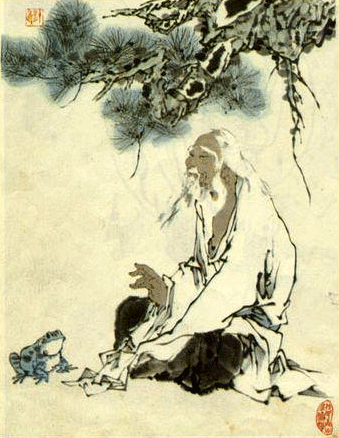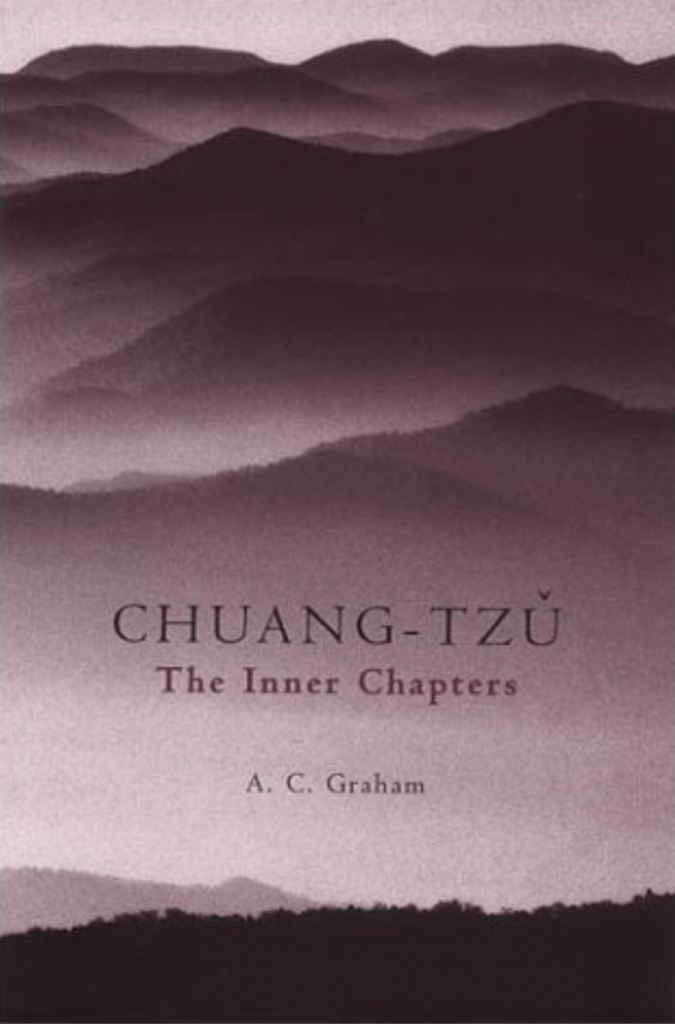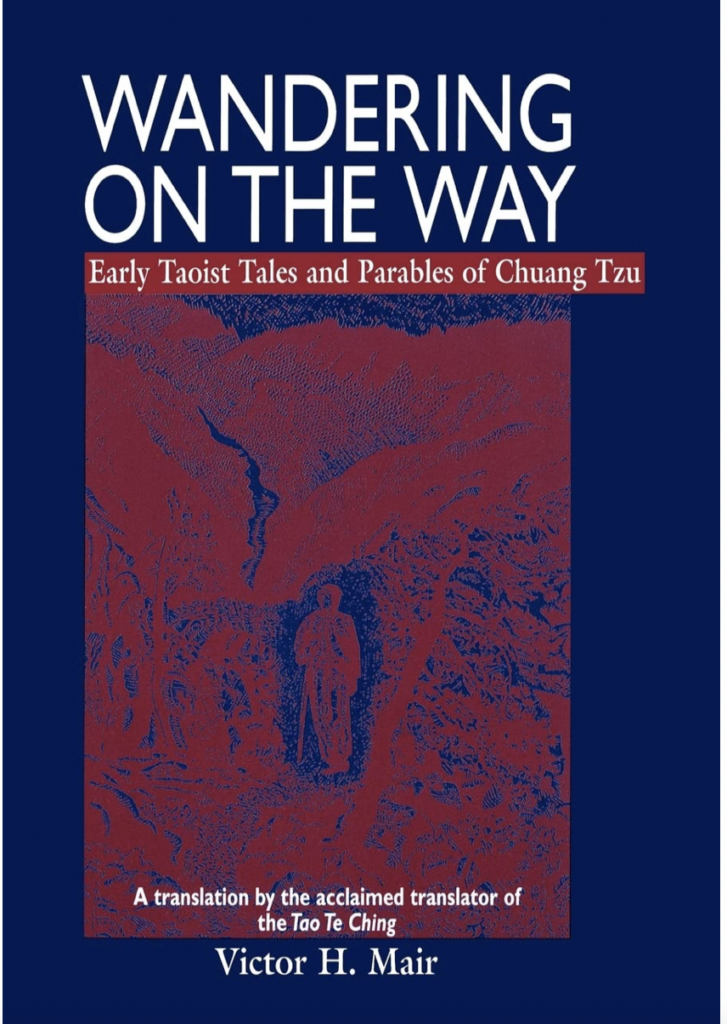
“We know very little about the life of Chuang Chou (commonly called Chuang-tzu or Zhuangzi in the pinyin romanisation system), and who wrote the nucleus of what Arthur Waley described as ‘one of the most entertaining as well as one of the profoundest books in the world’. The book is the longest of the classics of Taoism, the philosophy which expresses the side of Chinese civilisation which is spontaneous, intuitive, private, unconventional, the rival of Confucianism, which represents the moralistic, the official, the respectable.” This is how A C Graham introduces his outstanding presentation of the book, and the man, in Chuang-tzu – The Inner Chapters. Along with the Tao Te Ching, the Chuang-tzu is beyond a doubt one of the foundational texts of Taoism.
Although the Chuang-tzu is regarded as a near inexhaustible fountain of insights into the depths of Taoism, it has proven to be a challenge for both students and translators, and has not given rise to anything like the hundreds of translations now available for the Tao Te Ching.
Chuang-tzu, the man

The man whom Graham refers as Chuang-tzu – i.e., Master Chou – is the author of the first seven texts – the Inner Chapters – which scholars believe are the only texts which can be “confidently ascribed to him,” while the following twenty-six chapters were written by members of the School of Chuang-tzu, or even, apparently, members of other schools in dialogue with Chuang-tzu.
Graham tells us that “the Historical records of Ssu Ch’ien (c 145-c 89 BCE), in a brief biographical note, date Chuang-tzu in the reigns of King Hui of Liang or Wei (370-319 BCE) and King Hsüan of Ch’i (319-301 BCE),” so late 4th century, in the middle of the Warring States period (c. 475-221 BCE) and roughly two centuries after Confucius (c. 551–c. 479 BCE). These records indicate that Chuang-tzu “came from the district of Meng in the present province of Honan, and held a minor post there in Ch’i-yüan (‘Lacquer Garden’, perhaps an actual grove of lacquer trees) which he abandoned for private life. For further information we have only the stories in the book which carries his name, a collection of writings of the fourth, third and second centuries BC of which at least seven Inner Chapters are generally recognises as his work.”
Chuang-tzu, the book
As one reads the very first chapter, entitled “Going rambling without a destination,” it does not take long before one does indeed feel thoroughly lost, and start looking for help in Graham’s introductory notes. This is definitely an unusual text written by an unusual man. Graham agrees and explains: “The more closely one reads the disconnected stories and fragmentary jottings of the Inner Chapters, the more aware one becomes of the intricacy of its texture of contrasting yet reconciled strands, irreverent humour and awe at the mystery and holiness of everything, intuitiveness and subtle, elliptical flights of interest, human warmth and inhuman impersonality, folkiness and sophistication, fantastic unworldly raptures and down-to-earth observation, a vitality at its highest intensity in the rhythms of the language which celebrates death, an effortless mastery of words, an invulnerable confidence and a bottomless scepticism. One can read him primarily as a literary artist, as Confucians have done in China. However, one cannot get far enough in exploring his sensibility as a writer without finding one’s bearing in his philosophy.”
It may be helpful to mention here that, in addition to what one could call a uniquely intuitive “rambling” way of thinking that keeps on relating seemingly unrelated insights, Chuang-tzu’s text went through a harsh process of “compression” that added to its fragmentary aspect. Chad Hansen, the author of the entry on Zhuangzi in the Stanford Encyclopedia of Philosophy, explains that “a scholar working around 600 years later after the fall of the Han, Guo Xiang (d. 312), edited and reduced what he saw as a haphazardly accumulated cluster of apocryphal and possibly authentic texts. He concluded that many were added after the time Zhuangzi lived. Guo reports compressing that prior collection of writings from fifty-two chapters to thirty-three. This is the extant text on which our knowledge is based. Guo divided the chapters he had chosen into three sections: the “Inner Chapters” (1–7), the “Outer Chapters” (8–22) and the “Miscellaneous Chapters” (23–33). He attributed only the first section to the period dating from Zhuangzi’s lifetime—hence possibly originating from Zhuangzi himself. The second grouping may have included writings of a “School of Zhuangzi.” Modern scholarship assigns various sources of other influences found in both the second “outer” and final ‘miscellaneous’ chapters.”

The Warring States period is now regarded as the “great creative period of Chinese philosophy” and, as Victor Mair notes “virtually all of the philosophical schools of [this period] were in dialogue with each other.” This is especially true for Chuang-tzu whose comments almost always came as responses to the other philosophers of his time – the Confucians and Lao-tzu, of course, but also Mo-ti (Mo-tzu), the founder of the Mohist school, Yang Chu (c. 350 BCE) the founder of the “Nurture of Life” school), whom the moralistic schools condemned as an egoist, and last, at the very end of the 4th century BC, came “the Sophists or Logicians – the School of Names and Debate, because they did not actually develop any syllogistic reasoning nor discover any laws of thought.”
The big rethink in Chuang-tzu’s time: “What is the Way?”
Graham sets out the socio-cultural context within which Chuang-tzu, along with the other thinkers of his time, carried out a big rethink about “What is the Way” against the background of uninterrupted armed conflicts between the states vieing for power which ended with the unification of China under the control of the Chin (Qin) dynasty in 221 BCE. He writes: “Political disunity and rapid social and technological change, at a pace never afterwards equalled in Chinese history until the 19th century, had undermined the religion, moral code and political institutions of the declining Chou (Zhou) dynasty, and thrown open the question ‘What is the Way?’ – the way that the empire should be ordered and individuals should conduct their lives. Confucius was a conservative who set out to restore the moral and cultural heritage of the Chou, himself unaware of the originality of his own reinterpretations of the tradition which he was refining and clarifying.” Confucius had lived during the period referred to as the Spring and Autumn period (after the name of the Spring and Autumn Annals) during which the power held by the Chou dynasty was unraveling and the country was caught in a process of fragmentation into smaller states controlled by local warlords. Confucius’ response was one of restoring the former order. Mair says that, “for Chuang Tzu, the Confucianists were much too stiff and stuffy, too hidebound and hierarchical. Master Chuang took great delight in making fun of Confucius and his disciples.” In many ways, the moralist and politician Confucius had been was the very opposite of the dreamer who enjoys musing over whether he is a man who dreams that he is a butterfly or a butterfly who dreams he is a man! Yet, Graham points out that Chuang-tzu also, at times, “chooses to present Confucius as sympathising in theory with is own philosophy.” This, he finds, is “a puzzling question.” Chuang-tzu credits Confucius “with having the dignity to accept himself as he is.” Daoists do “see it as a weakness even to wish that the inevitable could be otherwise.” Graham also suggests that “it is almost as though Confucius were a father-figure whose blessing the rebellious son like to imagine would have been granted in the end.” The foremost Confucian in Chuang-tzu’s time was Mencius (372–289 BCE). Mair says that, unlike Confucius, “Mencius emphasized that human nature is basically good and that all men could become sages by fulfilling their inherent potential. He tempered the aristocratic side of Confucianism by being a champion of the common people and speaking out for humane government. This he did by stressing the role of the scholar-official in inculcating moral values in the ruler who, as a result, would be encouraged to treat his subjects more kindly. Of all the early Confucian thinkers, Mencius was the most concerned with individual human development, but always within the context of creating a good society.” He appears to have had a progressive disposition that could resonate with Chuang-tzu’s open-mindedness. Still he was a moralist and a politician, and, to be fair, Chuang-tzu’s mood was that of a poet, even a mystic, with a taste for philosophy, but nothing but scorn for “office” and “wealth.”
Graham writes that in the 5th century BCE, Mo Ti (Mo tzu) had been “the first to propose new foundations; he laid down the principle of universal love, and submitted traditional rules and institutions to the test of whether in practice they benefit men or harm them, or benefit everyone or some at the expense of the rest. The rivalry between Confucians and Mohists continued until the end of the age of the philosophers. For Chuang-tzu, it only confirmed that moralists arguing from different standpoints can never reach agreement, and encouraged him in his uncompromising moral relativism.”
Then, Graham continues, “in the nearer background of Chuang-tzu’s thought are philosophers of the 4th century BC, whose writings do not survive. [Among these] the “Nurture of Life” school led by Yang Chu (c. 350 BC), whom the moralistic schools condemned as an egoist. In a world in which members of the upper class were expected to pursue a public career, Yang Chu was the first spokesman of those who preferred the tranquillity of private life to the cares and dangers of office. His philosophy, although it contributed to Taoism, had nothing mystical about it. Just as much as the Mohists, the Yangists judged conduct by the test of practice benefit and harm, but drew a different conclusion – that life is more important than the things which sustain it, and that to pursue riches and power may be dangerous to health and survival. Four chapters of Chuang-tzu, which we call “Yangist miscellany,” seem to be late writings of this school.”
Mair notes that “By the end of the 4th century, all but the Confucians had recognized that the authority of the ancient sages could no longer be depended upon as an adequate guide to the contemporary world that had changed so tremendously. Master Chuang was among those who denied the relevance of the ancient sages for the contemporary world.” This strikes me as an uncanny parallel with the “crisis of meaning” the metamoderns are now talking about. It is also in such periods that Sophists appear on the scene, as thought seem to have lost access to a genuine quest for the truth, or, here, the Way.
These came at the end of the 4th century under the guise of the School of Names and Debate. Graham says that Chuang-tzu may have been at some point a disciple of Hui Shih, regarded as the greatest of the sophists, and many of his comments appear to have been responses to Hui Shih’s ideas, though it is not necessarily made explicit in Chuang-tzu’s text. Chuang-tzu, however, later “turned away from him, towards the cult of intuitiveness and spontaneity in both political and private action which was to become characteristic of Taoism.”
Graham explains that, “Unlike the Confucians and the Mohists, the early Taoists did not form an organised school; the name was applied to them retrospectively, and is first attested in the classification of “Six Schools” by Ssu-ma T’an (died 110 BC). As far as our information goes, Chuang-tzu himself may have been the very first of them. The great Taoist classic Lao-tzu is traditionally ascribed to Lao Tan (Old Tan), supposed contemporary of Confucians and founder of the school, but is not attested until late in the 3rd century BC, and there is no trace of its influence in the Inner Chapters. In taking the side of spontaneity against Hui Shih’s logic Chuang-tzu helped to tip the scale at that critical moment when the Chinese glimpsed the rationalist path which unknown to them was already being followed by the Greeks, but did not take it.”
Mair, however, writing in 1998, only two years earlier than Graham, does note that, like the Old Masters, represented under the name of the most probably legendary Laozi, “Master Chuang held that what can be said of the Way is not really the Way, and there are many other points of similarity between them. The Old Masters were the originators of the sayings that were compiled as the Tao Te Ching around the end of the third century BCE. Master Chuang quotes from the Tao Te Ching repeatedly; dozens of examples could be cited … What is intriguing, however, is that they usually are not exact quotations … This indicates that the Tao Te Ching was still probably circulating as oral tradition at the time of Chuang Chou and had not yet coalesced as a written text, certainly not the text that we know today.
I take these two arguments to be two plausible interpretations of the relationship between Lao-tzu and Chuang-tzu. In addition, it is clear that, as Mair notes, “the Tao Te Ching was addressed to the sage-king; it is basically a handbook for rulers. The Chuang-tzu, in contrast, is the earliest Chinese text to present a philosophy for the individual. The authors of the Tao Te Ching were interested in establishing some sort of Taoist rule, while the authors of the Chuang-tzu opted out of society, or at least of power relationships within society. Master Chuang obviously wanted no part of the machinery of government. He compared the state bureaucrat to a splendidly decorated ox being led to sacrifice, while he preferred to think of himself as an unconstrained piglet playing in the mud. The Tao Te Ching offers the Way as a guide for life and it propounds nonaction as a means to achieve one’s purpose in the workaday world. Master Chuang believed that the Way had supreme value in itself and consequently did not occupy himself with its mundane applications. Rather than paying attention to the governance of human society (the fundamental concern of most early Chinese thinkers), he stressed the need for transcendence and the freedom of the individual from such worldly concerns.”
Sources:
A C Graham – Chuang-Tzu, The Inner Chapters
Victor Mair – Wandering on the Way – Early Taoist Tales and Parables of Chuang Tzu
Chad Hansen – Zhuangzi in the Stanford Encyclopedia of Philosophy
